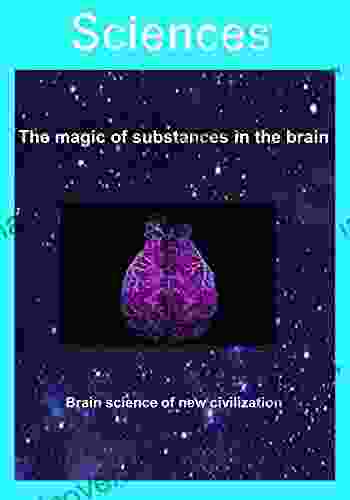The Magic of Substances in the Brain: Uncovering the Complexities of the Human Mind

The human brain is a complex and fascinating organ, and the substances within it play a vital role in our thoughts, feelings, and behaviors. These substances, which include neurotransmitters, hormones, and other molecules, work together to create the unique human experience.
In this article, we will explore the different substances in the brain and how they work together to create the complex tapestry of human consciousness. We will also discuss the role that these substances play in mental health and how imbalances in their levels can lead to a variety of mental health disorders.
Neurotransmitters are chemical messengers that allow neurons to communicate with each other. They are released from the presynaptic neuron and travel across the synaptic cleft to bind to receptors on the postsynaptic neuron. This binding triggers a cascade of events that can lead to the excitation or inhibition of the postsynaptic neuron.
5 out of 5
| Language | : | English |
| File size | : | 767 KB |
| Text-to-Speech | : | Enabled |
| Screen Reader | : | Supported |
| Enhanced typesetting | : | Enabled |
| Word Wise | : | Enabled |
| Print length | : | 16 pages |
| Lending | : | Enabled |
There are many different neurotransmitters in the brain, each with its own unique function. Some of the most important neurotransmitters include:
- Glutamate: Glutamate is the most abundant neurotransmitter in the brain and is responsible for excitatory synaptic transmission. It is involved in a wide range of brain functions, including learning, memory, and cognition.
- GABA: GABA is the main inhibitory neurotransmitter in the brain and is responsible for calming down neural activity. It is involved in a variety of brain functions, including anxiety, sleep, and motor control.
- Dopamine: Dopamine is involved in reward, motivation, and pleasure. It is also involved in a variety of brain functions, including attention, learning, and movement.
- Serotonin: Serotonin is involved in mood, sleep, and appetite. It is also involved in a variety of brain functions, including pain perception, body temperature regulation, and sexual behavior.
- Norepinephrine: Norepinephrine is involved in arousal, attention, and motivation. It is also involved in a variety of brain functions, including blood pressure regulation, heart rate, and breathing.
Hormones are chemical messengers that are released into the bloodstream by endocrine glands. They travel throughout the body and bind to receptors on target cells. This binding triggers a cascade of events that can lead to a variety of physiological and behavioral changes.
There are many different hormones in the body, each with its own unique function. Some of the most important hormones that affect the brain include:
- Cortisol: Cortisol is released in response to stress and is responsible for the "fight or flight" response. It increases heart rate, blood pressure, and respiration, and it also releases glucose into the bloodstream.
- Adrenaline: Adrenaline is also released in response to stress and is responsible for the "fight or flight" response. It increases heart rate, blood pressure, and respiration, and it also dilates the airways.
- Estrogen: Estrogen is a sex hormone that is produced by the ovaries in women. It is involved in a variety of reproductive functions, including the menstrual cycle and pregnancy. Estrogen also has a number of effects on the brain, including improving mood, memory, and cognition.
- Testosterone: Testosterone is a sex hormone that is produced by the testes in men. It is involved in a variety of reproductive functions, including sperm production and sexual behavior. Testosterone also has a number of effects on the brain, including increasing aggression and libido.
The substances in the brain play a vital role in mental health. Imbalances in the levels of these substances can lead to a variety of mental health disorders, including:
- Anxiety disorders: Anxiety disorders are characterized by excessive fear and worry. They can be caused by a number of factors, including genetics, life experiences, and imbalances in the levels of neurotransmitters such as GABA and serotonin.
- Mood disorders: Mood disorders are characterized by changes in mood, such as depression and mania. They can be caused by a number of factors, including genetics, life experiences, and imbalances in the levels of neurotransmitters such as dopamine and serotonin.
- Psychotic disorders: Psychotic disorders are characterized by a loss of touch with reality. They can be caused by a number of factors, including genetics, life experiences, and imbalances in the levels of neurotransmitters such as glutamate and dopamine.
The substances in the brain are essential for our thoughts, feelings, and behaviors. Imbalances in the levels of these substances can lead to a variety of mental health disorders. By understanding the role that these substances play in mental health, we can develop more effective treatments for these disorders.
5 out of 5
| Language | : | English |
| File size | : | 767 KB |
| Text-to-Speech | : | Enabled |
| Screen Reader | : | Supported |
| Enhanced typesetting | : | Enabled |
| Word Wise | : | Enabled |
| Print length | : | 16 pages |
| Lending | : | Enabled |
Do you want to contribute by writing guest posts on this blog?
Please contact us and send us a resume of previous articles that you have written.
 Top Book
Top Book Novel
Novel Fiction
Fiction Nonfiction
Nonfiction Literature
Literature Paperback
Paperback Hardcover
Hardcover E-book
E-book Audiobook
Audiobook Bestseller
Bestseller Classic
Classic Mystery
Mystery Thriller
Thriller Romance
Romance Fantasy
Fantasy Science Fiction
Science Fiction Biography
Biography Memoir
Memoir Autobiography
Autobiography Poetry
Poetry Drama
Drama Historical Fiction
Historical Fiction Self-help
Self-help Young Adult
Young Adult Childrens Books
Childrens Books Graphic Novel
Graphic Novel Anthology
Anthology Series
Series Encyclopedia
Encyclopedia Reference
Reference Guidebook
Guidebook Textbook
Textbook Workbook
Workbook Journal
Journal Diary
Diary Manuscript
Manuscript Folio
Folio Pulp Fiction
Pulp Fiction Short Stories
Short Stories Fairy Tales
Fairy Tales Fables
Fables Mythology
Mythology Philosophy
Philosophy Religion
Religion Spirituality
Spirituality Essays
Essays Critique
Critique Commentary
Commentary Glossary
Glossary Bibliography
Bibliography Index
Index Table of Contents
Table of Contents Preface
Preface Introduction
Introduction Foreword
Foreword Afterword
Afterword Appendices
Appendices Annotations
Annotations Footnotes
Footnotes Epilogue
Epilogue Prologue
Prologue Douglas W Tallamy
Douglas W Tallamy James Joyce
James Joyce Richard Wehrman
Richard Wehrman Don K Philpot
Don K Philpot Joseph Tusiani
Joseph Tusiani Ben Tallon
Ben Tallon Chris Portie
Chris Portie Douglas Adams
Douglas Adams Helena Rookwood
Helena Rookwood Hildegarde Deuzo
Hildegarde Deuzo Paula Polk Lillard
Paula Polk Lillard Leigh Owen
Leigh Owen Jacqueline Suskin
Jacqueline Suskin Revised Edition Kindle Edition
Revised Edition Kindle Edition Chris Beckett
Chris Beckett Hannah Howell
Hannah Howell Elon Gaezos
Elon Gaezos Vignes Chandran
Vignes Chandran Mi Park
Mi Park Kelly Keaton
Kelly Keaton
Light bulbAdvertise smarter! Our strategic ad space ensures maximum exposure. Reserve your spot today!

 Alexander BlairThe Man Who Talked With The Indians: A Story of Courage, Communication, and...
Alexander BlairThe Man Who Talked With The Indians: A Story of Courage, Communication, and... Mario SimmonsFollow ·6.3k
Mario SimmonsFollow ·6.3k Harvey HughesFollow ·12.2k
Harvey HughesFollow ·12.2k Marcel ProustFollow ·13.1k
Marcel ProustFollow ·13.1k Tom ClancyFollow ·11.5k
Tom ClancyFollow ·11.5k Christopher WoodsFollow ·10.6k
Christopher WoodsFollow ·10.6k Eddie BellFollow ·13.6k
Eddie BellFollow ·13.6k Fred FosterFollow ·6.1k
Fred FosterFollow ·6.1k Pablo NerudaFollow ·18.4k
Pablo NerudaFollow ·18.4k

 Eugene Powell
Eugene PowellComplete Guide to Using Yoga With Kids: Benefits, Tips,...
Yoga is an ancient practice that has been...

 Benji Powell
Benji PowellHow to Make $000 Per Week on Craigslist
Are you looking for a way to make extra money...

 Gabriel Garcia Marquez
Gabriel Garcia MarquezGrocery Row Gardening: The Exciting New Permaculture...
Kick-start your gardening journey with the...

 Hayden Mitchell
Hayden MitchellUnveiling the Gripping World of Winterwood: Ben Hood...
In the annals of crime thrillers, the...

 E.M. Forster
E.M. ForsterThe Financial Advisor Guide To Managing and Investing...
As a financial...

 Lee Simmons
Lee SimmonsIn My Shoes Memoir: A Poignant Journey of Resilience,...
In the tapestry of life, adversity often...
5 out of 5
| Language | : | English |
| File size | : | 767 KB |
| Text-to-Speech | : | Enabled |
| Screen Reader | : | Supported |
| Enhanced typesetting | : | Enabled |
| Word Wise | : | Enabled |
| Print length | : | 16 pages |
| Lending | : | Enabled |









